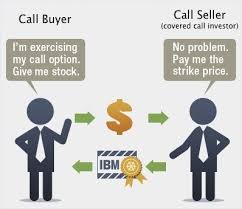
Option assignments occur in two basic varieties. First, on expiration Friday (or Thursday or Wednsday depending on the instrument your trading, but most commonly on Friday). If you have a position that is .01 in the money, or more, you WILL be assigned. For instance, if you have a 100 Call on stock XYZ that expires today, and XYZ closes (AFTER HOURS) at 100.01, you will find that you own, sometime Saturday, 100 shares of XYZ that you paid $100/share for.
Now this option might have only cost you $100 or so. But all of a sudden, due to the inherent multiplier in options, you are now out of pocket $10,000.00. What if you're account only had $5,000.00 in it? Well, you are going to get both (a) a Regulation T Notice and (b) margin call from your broker. First thing Monday morning, your broker will automatically liquidate the position. What if there is adverse news over the weekend and the opening price is only $80? Well you just lost $2,000.0 -- in a $5,000.00 account. In other words, that $100 option just cost you 40% of your entire account. This happens.
What if you had "hedged" the position though, and had a vertical call spread? For instance, you might have bought the $100/$105 spread on XYZ. Well if XYZ closes anywhere above $105 you are ok because BOTH positions will be auto-exercised. This SOMETIMES results in a margin call as well -- but don't worry. Option clear throughout the day on Saturday and your account will frequently show one position and the other not exercised yet. By Sunday morning it will be fixed. By way of example, I had a very large position (for me) (20 contracts) in the LNKD 92.5/95 vertical call before earnings. Well earnings did what they were supposed to and LNKD jumped to 104. Well Saturday morning, all of a sudden, I was SHORT 2000 shares of LNKD and had received roughly $190K in cash into my account. This sends off all kinds of margin alerts. I got an email, a call, and another call. Ignore them, they're idiots. The 92.5 side simply hadn't cleared yet. Three hours later the other option cleared, buying the shorts back at 92.5. Then Sunday morning, your account statement will reflect that all trades happened at the same time.
HOWEVER, what if, on that 100/105 spread, XYZ closes at 103 on Friday? Well, guess what, you'll be assigned on the 100 position, the 105 will expire worthless, and now your back in margin call.
MORAL OF THE STORY:
DON'T EVER LET YOURSELF BE ASSIGNED ON A SPREAD THAT'S NOT FAR IN THE MONEY ON BOTH LEGS.

What if, on Friday, the price of XYZ was at $106 at close? You better have closed the spread, because of after hours trading. The price of XYZ can move after hours -- but you can't get out of the options. So if the market closes at 106, and you say good, both legs will clear and I won't pay commissions (or pay less commissions) and get a huge tax break, you could be wrong, as in after hours the market might go back to $104.98. Then you're screwed, only the 100 option gets exercised and you go into margin call. I'm convinced when your near a strike the market makers manipulate the after hours markets to have this happen.
Of course if you have enough cash in your account, you won't get margin called -- you're risk profile will just be largely out of whack.
And this isn't to say you can't have a big benefit from this. My single most profitable trade EVER occurred on a spread that was $.50 above the line, I didn't close it, and then in after hours the price dropped. So I got assigned long on the lower strike. Well, that weekend there was big news involving the company and the price jumped 15% the next morning. In that case, here's what happens -- I own the 100 (long) /105 (short) vertical. After hours, the price is $104.92. Well that spread was worth $4.85 at close on 20 contracts, or $9,700. Well, Saturday I'm now the proud owner of 2,000 shares bought at $100.00 each, for a net cost of $200,000 -- oops. Margin call, broker call, broker email, etc. Well they inform me the trade will immediately close at open on Monday. Well the price jumped, and the position was closed, at $240,000.00. My original investment of $8,500.00, that I didn't want to close at $9,700.00, netted me $40,000.00, or roughly a 470% return. BUT, what if the price had gone down 20%? Well I would be owing my broker money and have completely blown out my account.
If you have ANY questions on this, please let me know.
Now SITUATION TWO -- and you will, sooner or later, encounter this. Let's say we have that same 100(long)/105 (short) spread on XYZ. Only we own the September spread and today (Friday) XYZ closes at 103. No bigger. UNLESS someone exercises their 100 spread. American style options can be exercised at anytime. Why would this happen with time value? Who knows, most likely someone needed to unwind a position, hedge something, take profits, any number of things really.
Well if you had a 10 contract position, on Saturday your account is now down $100,000.00 in cash and you won 1,000 shares of XYZ. You will again go into margin call. However, while this is a headache and you will have to deal with your broker, you don't need to panic because the position is still hedged. You can certainly still lose money -- but only up to the 105 line.
What happens? Well your broker will force you to exit the position Monday morning at the open. If you BEG and wheedle, the broker might let you close the position yourself, so you can close at the midpoint instead of just a market order. They should let you do this because the position is still hedged, but you are technically in a Reg T violation, so they won't let you hold it for long. Monday you'll have to sell your shares and buy back the short calls. This should be, at worst, a break even situation because of the time value left in the short calls. However, markets fluctuate and you might have to sell your stock at something like 104 and by the time you exit the short calls its up to 105 (or you get a bad fill price) so you give back some.
When this happens, take your lumps and move on. I have this happen about once a quarter and my worse loss was 4%. There's nothing you can do to protect against this. You are hedged, and you won't blow your account out, but it does suck.
I hope that clears some things. If not, please let us know.
By Christopher B. Welsh
Christopher B. Welsh is a SteadyOptions contributor. He is a licensed investment advisor in the State of Texas and is the president of a small investment firm, Lorintine Capital, LP which is a general partner of two separate private funds. He offers investment advice to his clients, both in the law practice and outside of it. Chris is an active litigator and assists his clients with all aspects of their business, from start-up through closing.
Chris is managing the Anchor Trades portfolio.



Join the conversation
You can post now and register later. If you have an account, sign in now to post with your account.
Note: Your post will require moderator approval before it will be visible.